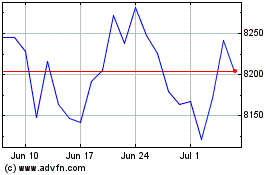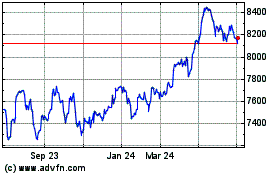By Jenny Gross and Nicholas Winning
LONDON--Prime Minister Theresa May on Tuesday said the U.K.
intends to leave the European Union's single market, outlining a
plan for a definitive break from the bloc and answering the biggest
open question about her vision for Britain's future.
I n her most detailed speech yet, Mrs. May said the U.K.
wouldn't seek a new relationship that was "half-in, half-out" of
the EU. It would no longer abide by the bloc's immigration rules or
be subject to jurisdiction of the European Court of Justice, which
the EU insists are requirements for unfettered access to its market
of 440 million consumers.
At times conciliatory and other times tough, the British leader
described an independent U.K. with full control over its borders
that nonetheless maintains a close and friendly trading
relationship with the EU. "We will continue to be reliable
partners, willing allies and close friends," she said.
In comments that appeared to soothe investors, she said she
would give lawmakers, a majority of whom backed staying in the EU,
a vote on the final deal and wanted a period to make the transition
to the new relationship as smooth as possible.
Sterling rose by as much as 2.8% against the U.S. dollar, to
$1.228 during the speech, after plummeting to a 31-year low on
expectations that Mrs. May would announce the U.K. is leaving the
single market.
"What I am proposing cannot mean membership of the single
market," Mrs. May said. "Instead we seek the greatest possible
access to it through a new, comprehensive, bold and ambitious
free-trade agreement."
She said the U.K. wouldn't be seeking full membership to the
EU's customs union--by which members apply a common set of tariffs
and import quotes to nonmembers--which would prevent Britain from
negotiating its own trade deals with non-European countries. She
didn't spell out what sort of membership she would seek.
"I want Britain to be able to negotiate its own trade
agreements," she said. "But I also want tariff-free trade with
Europe and cross-border trade there to be as frictionless as
possible."
It is unclear what sort of preferential trade access EU leaders
and officials would agree to give the U.K. Eager to discourage
anti-EU movements across Europe, they have said there is no
appetite for giving the U.K. a better deal than existing
membership.
Some economists say leaving the single market will create
uncertainties for U.K. businesses that rely on trade with Europe.
Nearly half of British goods and services exports go to the EU,
compared with 5% to India and China, two markets with which Britain
aims to increase trade once it leaves the bloc.
Brexit supporters said they welcomed the tough position Mrs. May
set out ahead of negotiations, which she is expected to trigger by
the end of March.
Some had long called for Britain to leave the single market and
potentially the customs union, but seek to maintain trading
advantages through a trade deal with the EU.
"Britain must leave the EU at the earliest opportunity so that
we can take full advantage of the huge benefits Brexit will bring,
and this must not be impeded or delayed by an unnecessarily long
period of transition," said Richard Tice, co-chair of Leave Means
Leave.
A spokeswoman for Mrs. May said she hopes to speak to European
leaders, including German Chancellor Angela Merkel and French
President François Hollande, in the coming days about the
speech.
Czech EU affairs minister Tomas Prouza tweeted that the "UK's
plan seems a bit ambitious--trade as free as possible, full control
on immigration...where is the give for all the take?"
German Foreign Minister Frank-Walter Steinmeier said after the
speech that he welcomed Mrs. May's comments on wanting a
constructive partnership and friendship with the EU.
"We also want, if possible, good, close and trustworthy
relationships and wish for constructive negotiations with this
aim," he said. "But our line is and remains: Negotiations only
begin once Great Britain has officially communicated its wish to
leave."
Mrs. May said she planned for a tough negotiation. She said a
punitive deal that punishes Britain to discourage other countries
from taking the same path would be "calamitous."
"While I am confident that this scenario need never arise--while
I am sure a positive agreement can be reached--I am equally clear
that no deal for Britain is better than a bad deal for Britain,"
Mrs. May said.
Officials said if there is no free trade deal the U.K. would
have to resort to World Trade Organization rules, meaning U.K.
exports to the EU would face new tariffs on many items.
Mrs. May said it is in the U.K. or EU's interest for there to be
a period to phase in Britain's new relationship with the EU, which
would give businesses enough time to plan and prepare for new
arrangements.
President-elect Donald Trump said in a weekend interview that
the U.S. wanted to come to a quick trade deal with the U.K.,
comments Mrs. May referenced during the speech.
Following the speech, some Brexit supporters called on Mrs. May
to go further and set out a clear time frame for when the U.K.
would no longer be subject to EU rules. Nigel Farage, a chief
Brexit campaigners and former leader of the anti-EU UK Independence
Party, said from his Twitter account: "My worry is how long this is
going to take and when we will start doing a deal with the U.S.A.
and others." He said Mrs. May's speech echoed what he had been
saying for years.
Mrs. May's confirmation that the U.K. would leave the single
market marks a U-turn from comments before she became prime
minister. In April, she warned that it accounts for a huge volume
of Britain's trade and it wasn't realistic that the U.K. could
replace European trade with new markets.
On Tuesday, she acknowledged her changed position, saying the
economic indicators since the Brexit vote had been more positive
than many economists had predicted.
European Council President Donald said on Twitter that the bloc
was ready to negotiate the divorce. "Sad process, surrealistic
times, but at least more realistic announcement on Brexit."
Valentina Pop in Brussels and Andrea Thomas in Berlin
contributed to this article.
Write to Jenny Gross at jenny.gross@wsj.com and Nicholas Winning
at nick.winning@wsj.com
(END) Dow Jones Newswires
January 17, 2017 11:42 ET (16:42 GMT)
Copyright (c) 2017 Dow Jones & Company, Inc.
FTSE 100
Index Chart
From Mar 2024 to Apr 2024

FTSE 100
Index Chart
From Apr 2023 to Apr 2024
